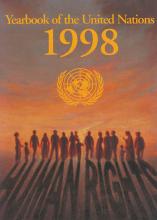Asia and the Pacific

- Author: United Nations
- Main Title: Yearbook of the United Nations 1998 , pp 240-323
- Publication Date: December 1998
- DOI: https://doi.org/10.18356/28d5e35f-en
- Language: English
In the Asia and Pacific region, ongoing UN activities to verify Iraq’s compliance with its weapons-related obligations under Security Council resolution 687(1991), which brought a formal ceasefire to the 1991 Gulf War, suffered a major setback in 1998. A crisis was narrowly averted in February when, in the light of Iraq’s continued refusal to allow the UN Special Commission (UNSCOM) charged with verifying its disarmament to conduct further inspection activities, the Secretary-General travelled to Baghdad and negotiated a Memorandum of Understanding on access to sensitive sites. As a result of that agreement, UNSCOM’s inspections resumed in March. However, as the year progressed, Iraq’s resistence to transparency and sustained full cooperation stiffened and UNSCOM remained unable to report to the Council that Iraq had finally fulfilled its obligations so that the sanctions on it could be lifted. Iraq’s posture ultimately led UNSCOM and the International Atomic Energy Agency (IAEA), the specialized agency monitoring Iraq’s nuclear activities, to withdraw from the country on 16 December. Following the withdrawal, the United States and the United Kingdom took independent military action against Iraq. In view of the continuing sanctions, the Council extended to 24 May 1999 the 1995 humanitarian programme for the Iraqi people based on an oil-for-food formula and raised the limit on the production of Iraqi oil to allow increased purchases of humanitarian goods.
-
From This Site
/content/books/9789210574983s006-c004dcterms_title,dcterms_subject,pub_keyword-contentType:Journal -contentType:Contributor -contentType:Concept -contentType:Institution105


